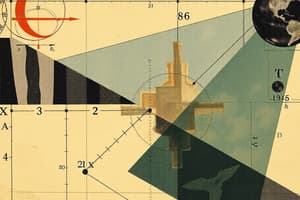Podcast
Questions and Answers
L'algebra si occupa delle regole per manipolare i numeri.
L'algebra si occupa delle regole per manipolare i numeri.
False (B)
La geometria include lo studio delle figure e delle loro posizioni nello spazio.
La geometria include lo studio delle figure e delle loro posizioni nello spazio.
True (A)
Il calcolo non tratta il cambiamento e il movimento.
Il calcolo non tratta il cambiamento e il movimento.
False (B)
La statistica è importante per analizzare i dati e prendere decisioni informate.
La statistica è importante per analizzare i dati e prendere decisioni informate.
La teoria dei numeri si concentra sulle proprietà delle forme geometriche.
La teoria dei numeri si concentra sulle proprietà delle forme geometriche.
La logica è utilizzata per costruire argomenti matematici.
La logica è utilizzata per costruire argomenti matematici.
Le funzioni esprimono relazioni tra valori di output e variabili non cambiate.
Le funzioni esprimono relazioni tra valori di output e variabili non cambiate.
La probabilità tratta della certezza degli eventi.
La probabilità tratta della certezza degli eventi.
La Biologia utilizza i modelli di popolazione e l'analisi genetica.
La Biologia utilizza i modelli di popolazione e l'analisi genetica.
La Finanza non include l'analisi degli investimenti e la gestione del rischio.
La Finanza non include l'analisi degli investimenti e la gestione del rischio.
I numeri complessi estendono il sistema dei numeri reali per includere unità immaginarie.
I numeri complessi estendono il sistema dei numeri reali per includere unità immaginarie.
La ricerca operativa si concentra esclusivamente sulla statistica.
La ricerca operativa si concentra esclusivamente sulla statistica.
L'algebra astratta studia solo le equazioni lineari.
L'algebra astratta studia solo le equazioni lineari.
Flashcards
Sistema dei Numeri Reali
Sistema dei Numeri Reali
Insieme di tutti i numeri razionali e irrazionali. Fondamentale per molte applicazioni.
Sistema dei Numeri Complessi
Sistema dei Numeri Complessi
Estensione del sistema dei numeri reali che include unità immaginarie. Amplifica le possibilità di rappresentazione matematica.
Topologia
Topologia
Studia le trasformazioni di forme e spazi. Fondamentale in fisica e geometria.
Algebra Lineare
Algebra Lineare
Signup and view all the flashcards
Algebra Astratta
Algebra Astratta
Signup and view all the flashcards
Aritmetica
Aritmetica
Signup and view all the flashcards
Algebra
Algebra
Signup and view all the flashcards
Geometria
Geometria
Signup and view all the flashcards
Calcolo
Calcolo
Signup and view all the flashcards
Statistica
Statistica
Signup and view all the flashcards
Probabilità
Probabilità
Signup and view all the flashcards
Trigonometria
Trigonometria
Signup and view all the flashcards
Teoria dei numeri
Teoria dei numeri
Signup and view all the flashcards
Study Notes
Branches of Mathematics
- Arithmetic: The study of numbers, including operations like addition, subtraction, multiplication, and division. It forms the foundation for more advanced mathematical concepts.
- Algebra: Deals with symbols and the rules for manipulating them. Focuses on relationships between variables and equations.
- Geometry: The study of shapes, sizes, and positions of figures in space. Includes concepts such as lines, angles, triangles, circles, and solids.
- Calculus: Focuses on change and motion. Involves concepts like derivatives, integrals, and limits, used to analyze continuous functions.
- Statistics: Involves collecting, organizing, analyzing, and interpreting data. Important for drawing conclusions and making informed decisions based on data.
- Probability: Deals with the likelihood of events occurring. Used for prediction and decision-making in situations with uncertainty.
- Trigonometry: The study of triangles and their relationships, particularly the relationships between angles and sides. Has applications in navigation, engineering, and physics.
- Number Theory: Focuses on the properties of numbers, such as prime numbers, divisibility, and modular arithmetic.
Fundamental Concepts
- Sets: Collections of objects, used to define relationships between elements and operations.
- Functions: Relationships between input and output values. Expressing dependencies and transformations between quantities.
- Variables: Symbols representing unknown quantities that can change.
- Equations: Statements of equality between expressions. Used to solve for unknown variables.
- Inequalities: Statements that show the relative sizes between expressions using symbols like <, >, ≤, ≥.
- Proof: Logical arguments used to demonstrate the truth of mathematical statements beyond reasonable doubt.
Important Mathematical Tools and Techniques
- Algorithms: Step-by-step procedures for solving problems, often used in computer science.
- Logic: Formal rules of reasoning and deduction used to construct mathematical arguments.
- Models: Simplifications and representations used to analyze real-world phenomena.
- Problem-solving strategies: Methods and techniques used to break down complex problems and find solutions.
- Mathematical notation: Symbols and language used to express mathematical ideas concisely.
Applications of Mathematics
- Physics: Fundamental for describing forces, motions, and energy.
- Engineering: Critical for designing structures, systems, and mechanisms.
- Computer Science: Essential for algorithms, data structures, and problem-solving.
- Finance: Used in investment analysis, risk management, and financial modeling.
- Statistics: Used for data analysis in numerous industries and research areas.
- Operations Research: Utilized to improve efficiency in business operations including optimizing processes and distribution.
- Biology: Applications including population modeling, genetic analysis, and biomechanics.
Mathematical Systems
- Real Number System: Includes all rational and irrational numbers, essential for many applications.
- Complex Number System: Extends the real number system to include imaginary units and provides further possibilities for mathematical representation.
- Discrete Mathematics: Deals with discrete objects and their relationships. Examples include graph theory and combinatorics.
Key areas of study
- Linear Algebra: Focuses on vector spaces, matrices, and their applications.
- Abstract Algebra: Examines algebraic structures like groups, rings, and fields.
- Topology: Studies transformations of shapes and spaces.
- Differential Equations: Deal with the change of one variable based on others. Useful for modeling change.
Historical Context
- Ancient civilizations made significant contributions to arithmetic, geometry, and astronomy.
- Development of mathematics has been ongoing, with contributions from various cultures and periods.
- Modern mathematics is highly specialized and uses abstract concepts.
Studying That Suits You
Use AI to generate personalized quizzes and flashcards to suit your learning preferences.




